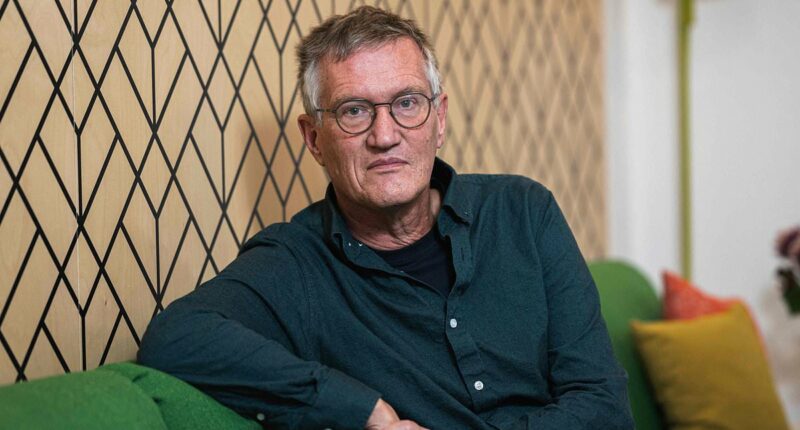Share this @internewscast.com
Attempts to eradicate Covid-19 were deemed “impossible” by the mastermind behind Sweden’s controversial anti-lockdown strategy.
In a revealing new memoir, Dr. Anders Tegnell, who served as Sweden’s state epidemiologist, provides an insider perspective on the pandemic. He candidly shares that by summer 2020, it was already clear to him that the virus would not simply vanish.
Consequently, the idea of prolonged societal shutdowns was dismissed as an option.
Sweden’s approach stood in stark contrast to the global trend. The Scandinavian country opted against strict lockdowns and mask mandates, favoring a more relaxed strategy that placed trust in citizens to exercise “common sense.”
Dr. Tegnell argued that proposing stringent stay-at-home orders, akin to those seen in the UK, would have demonstrated poor judgment.
Contrary to the dire predictions, Sweden navigated the pandemic with relatively favorable outcomes.
It comes as the UK Covid Inquiry yesterday concluded that lockdowns could have been avoided if the Government had responded to the pandemic earlier.
Whitehall was so badly prepared for the devastating virus that ministers were forced to take ‘tough decisions’ which amounted to ‘too little, too late’, Inquiry chair, Baroness Hallett, said.

In a memoir charting the pandemic in his eyes, Dr Anders Tegnell (pictured in October 2023) said it was obvious the virus would not be over by summer 2020. As such, shutting down society for so long was off the cards, he said

It comes as the UK Covid Inquiry yesterday concluded that lockdowns could have been avoided if the government had responded to the pandemic earlier. Pictured, a near deserted Piccadilly Circus, London, during England’s third national lockdown in January 2021
She also concluded the repeated lockdowns left ‘lasting scars on society and the economy’, brought ordinary childhood to a halt and delayed the diagnosis and treatment of other health issues.
Writing in his 282-page book, Tankar Efter en Pandemi, translated into English for the Daily Mail, he said: ‘It is easy to introduce strict measures and say that you are being cautious.
‘For me, this is a sloppy application of the precautionary principle.
‘It seemed as if many bodies were not conducting the impact assessments that we were conducting at the Public Health Agency.
‘Another aspect of lockdown that I mulled over was how easy it was for countries to quickly introduce incredibly tight restrictions without reflecting on how one might ease these restrictions in a responsible manner.
‘The pandemic might last several years. Previous pandemics have lasted at least one year.’
He added: ‘It was impossible to know exactly how long we were looking at with Covid but we knew that it wasn’t going to be over by summer, something we tried to emphasise at our press conferences.
‘It was impossible to keep society locked down for that long. How were we going to motivate people to open up again if the pandemic was still on-going?

Whitehall was so badly prepared for the devastating virus that ministers were forced to take ‘tough decisions’ which amounted to ‘too little, too late’, Inquiry chair, Baroness Heather Hallett, said

Writing in his 282-page book, Tankar Efter en Pandemi , the country’s former state epidemiologist said proposing strict stay at-home orders, like the ones deployed in Britain, would have shown ‘sloppy’ judgement
‘I never considered the ambition of wiping out the illness in its entirety to be a reasonable one. All experiences from previous pandemics showed that this was impossible.
‘There were plenty of us at the Public Health Agency who looked at the world around us with astonishment, while we were thrashing out measures and thinking about what we could do in Sweden that would be adequate.’
He said: ‘From the outside perspective, we were doing the exact opposite to the rest of the world.’
The country’s public health agency advised residents to practice social distancing throughout the pandemic.
Masks were never mandatory at any point. But they were recommended on public transport at stages.
Bars and restaurants remained open. However, opening hours were restricted and alcohol was banned after certain times during the biggest Covid waves.
Among Sweden’s stricter measures included a ban on visits to elderly care homes and limits on the number of people attending public gatherings.
Under its constitution, politicians are forbidden from interfering in the decisions and daily operations of the agency.

Masks were never mandatory at any point. But they were recommended on public transport at stages. Pictured, posters of Dr Tegnell displayed outside a restaurant in Stockholm in May 2020
But the Public Health Agency does not have the authority to pass laws itself and can only provide guidelines and recommendations to the government.
‘We knew it was very much not possible to change the law,’ Dr Tegnell wrote.
‘But proposing a law that would allow the Swedish parliament to introduce a lockdown at our recommendation was not something we ever considered.
‘The entire agency was behind what came to be known as the Swedish approach. We were gearing up for a marathon, not a sprint.’
He added: ‘Under Swedish law, measures also have to be proportionate to the risk. Intervention cannot be too great if the risk is minimal, which we believed was the case here.
‘Ultimately, I also believed that, in fact, people could do this by themselves, which subsequently proved to be true.’
Over the course of the pandemic his approach earned praise from the libertarian right in the UK and US, as well as the social democratic centre-left in Sweden.
The now 69-year-old became a cult figure in the country, with his face printed on T-shirts, soaps and mugs. Others even sported Tegnell tattoos.

Over the course of the pandemic Dr Tegnell’s approach earned praise from the libertarian right in the UK and US, as well as the social democratic centre-left in Sweden. Pictured, Dr Tegnell at a Covid press conference in April 2020

The epidemiologist, who lived alone on his family farm outside the city of Linköping, in the south of the country, admitted the attention he garnered was ‘unexpected’

The now 69-year-old became a cult figure in the country, with his face printed on T-shirts, soaps and mugs. Others even sported Tegnell tattoos. Pictured, then 32-year-old Gustav Lloyd Agerblad presenting his new tattoo in April 2020
The epidemiologist, who lived alone on his family farm outside the city of Linköping, in the south of the country, admitted the attention he garnered was ‘unexpected’.
With his Dutch wife forced to travel back to the Netherlands for family reasons, he saw no-one else outside of work except his sister Ingrid in the early days of the pandemic.
But he was also criticised repeatedly, including once by Sweden’s King Carl XVI Gustaf, for failing to restrict the spread of the virus, particularly among the most vulnerable.
Testing in Sweden also lagged behind other countries, with those infected in many districts expected to notify their own contacts.
In contrast, in Germany and Norway, small armies of contact tracers help track down people who may have been exposed.
It was only with the rise of the Alpha variant at the end of 2020 that Sweden really tightened its measures, restricting how many people could meet in groups from 50 to eight.
However, it still avoided a mandatory lockdown. The UK, meanwhile, was plunged into its second in autumn that year after cases spiked during the summer.
The UK’s Covid Inquiry yesterday singled out the country’s Eat Out to Help Out Scheme, which ran that summer, as a contributing factor to the rise.

Then-Chancellor, Rishi Sunak, launched the flagship offer in August 2020. Brits were given discounts for dining in restaurants in a bid to kickstart the hospitality industry that suffered heavily because of lockdowns
Suggested by Chancellor Rishi Sunak and agreed by then Prime Minister Boris Johnson to support hospitality venues in August 2020, the scheme was ‘devised in the absence of any scientific advice’ and ‘undermined public health messaging’, the Inquiry found.
In his book, Dr Tegnell wrote: ‘During the first wave, we had been criticised for underestimating risks and for not being clear enough that something big was happening.
‘At the agency, we listened to this criticism and took it with us into the autumn.
‘This time, we were going to be clearer and tell everyone that a second wave was going to come. Sweden was not going to escape it.’
Adapting measures to more local needs, Dr Tegnell and his team advised regional governments on a list of measures they could implement if cases rose.
But later in his memoir, he admitted the wave was ‘certainly worse than we had believed’.
He added: ‘During the worst week, over 600 people died in Sweden according to the World Health Organization — the same as the worst week of the first wave.
‘Retirement homes had been hit once more and the tough period when the intensive care units were under enormous pressure persisted for longer than during the first wave. The vaccine was desperately needed.’

But Dr Tegnell was criticised repeatedly, including once by Sweden’s King Carl XVI Gustaf (pictured), for failing to restrict the spread of the virus, particularly among the most vulnerable
Official figures, however, suggest Sweden is doing better than its European peers.
Excess deaths, sometimes known as extra deaths, are the number of deaths that are above the average for the same period in previous years.
The figure includes fatalities from all causes.
The method is considered the most consistent way to measure pandemic death tolls because official Covid deaths vary between countries due to differences in logging data.
An analysis of excess death figures across the globe up to May 2023 — when the UN World Health Organization (WHO) declared Covid was no longer a public health emergency of international concern — suggests Sweden fared better than the UK.
The nation logged an extra 185 deaths than expected per 100,000 people, giving it the 139th worst ranking of 237 countries.
The UK, in contrast, recorded an extra 346 deaths, placing it as 65th worst.
However, Sweden’s Scandinavian counterparts, which brought in stricter curbs, saw fewer fatalities.

Diary extracts from No10’s former chief scientific adviser, Sir Patrick Vallance (pictured right during a Covid press conference in March 2020), shown to the UK’s Covid inquiry revealed ex-Prime Minister Boris Johnson had become ‘obsessed with older people accepting their fate’

An analysis of excess death figures across the globe up to May 2023 — when the UN World Health Organization (WHO) declared Covid was no longer a public health emergency of international concern — suggests Sweden fared better than the UK
In Iceland, which ranked 211th worst, with 93 excess deaths per 100,000 people. Norway placed 162nd with 156 extra deaths.
In February 2022, the Swedish National Commission — an independent committee appointed by the government to evaluate the country’s pandemic response — concluded that voluntary measures adopted under Dr Tegnell were appropriate and maintained Swedes’ personal freedom.
However, earlier, far more extensive measures should have been taken, especially during the first wave.
Sweden’s economy also bounced back from the pandemic faster than any country in Europe, according to figures from the Organisation for Economic Co-operation and Development (OECD).
Although, like countless others, its growth has slowed pushing it towards a recession in recent months after high inflation and higher interest rates.
Its initial strong economic performance was in part due to its pandemic response, but also its ‘heavy reliance on industry’ and its ‘smaller services sector’, the OECD said.
In his book Dr Tegnell wrote: ‘I slowly realised that we at the Public Health Agency had acted in accordance with the precautionary principle — as I understood it — without fully realising it.
‘At the end of the day, I believed that it was quite close to ordinary common sense.
‘Yet, if I had been better read on the principle, I could have better responded to those who believed that we did not act cautiously during Covid.
‘My response would have been that in Sweden we absolutely acted cautiously in that we did not do too much.’
In an interview with the journal Nature on April 21, 2020, Dr Tegnell, also said: ‘Closing borders, in my opinion, is ridiculous, because Covid is in every European country now….closing schools is meaningless at this stage.
‘Moreover, it is instrumental for psychiatric and physical health that the younger generation stays active.’
It comes as the Covid Inquiry yesterday concluded that children were not prioritised enough with ministers failing to consider properly the consequences of school closures.
The report also said that lockdowns, while helping save lives, left lasting scars on society, bringing ordinary childhood to a halt, delaying treatment of non-Covid health conditions and worsening inequalities.
‘Had the UK been better prepared, fewer lives would have been lost, the socio-economic costs would have been substantially reduced and some of the decisions politicians had to take would have been far more straightforward,’ Lady Hallett concluded.
She also described February 2020 as ‘a lost month’ in which the UK could have made preparations that would have saved tens of thousands of lives.
The overall lack of urgency overall in government was ‘inexcusable’, she added.















